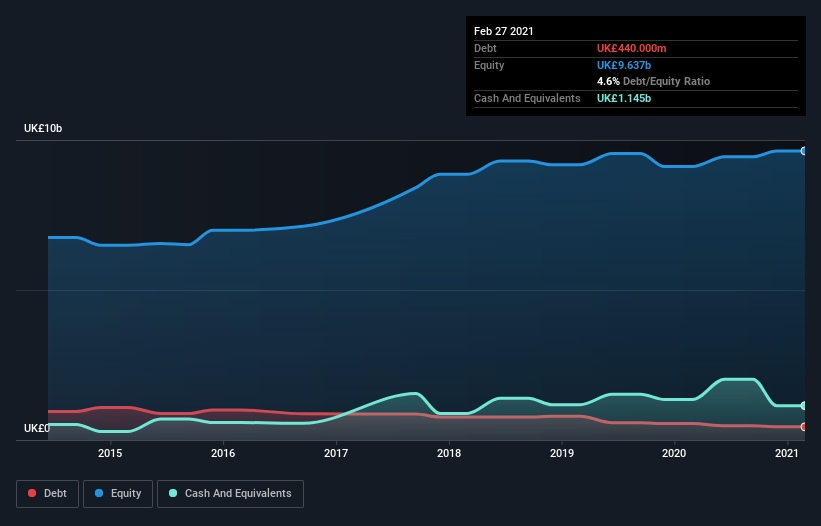These 4 Measures Indicate That Associated British Foods (LON:ABF) Is Using Debt Reasonably Well
Warren Buffett famously said, 'Volatility is far from synonymous with risk.' It's only natural to consider a company's balance sheet when you examine how risky it is, since debt is often involved when a business collapses. Importantly, Associated British Foods plc (LON:ABF) does carry debt. But should shareholders be worried about its use of debt?
When Is Debt A Problem?
Debt assists a business until the business has trouble paying it off, either with new capital or with free cash flow. In the worst case scenario, a company can go bankrupt if it cannot pay its creditors. However, a more frequent (but still costly) occurrence is where a company must issue shares at bargain-basement prices, permanently diluting shareholders, just to shore up its balance sheet. By replacing dilution, though, debt can be an extremely good tool for businesses that need capital to invest in growth at high rates of return. When we examine debt levels, we first consider both cash and debt levels, together.
See our latest analysis for Associated British Foods
How Much Debt Does Associated British Foods Carry?
The image below, which you can click on for greater detail, shows that Associated British Foods had debt of UK£440.0m at the end of February 2021, a reduction from UK£548.0m over a year. However, it does have UK£1.15b in cash offsetting this, leading to net cash of UK£705.0m.
How Healthy Is Associated British Foods' Balance Sheet?
Zooming in on the latest balance sheet data, we can see that Associated British Foods had liabilities of UK£2.69b due within 12 months and liabilities of UK£3.85b due beyond that. Offsetting this, it had UK£1.15b in cash and UK£1.39b in receivables that were due within 12 months. So its liabilities outweigh the sum of its cash and (near-term) receivables by UK£4.00b.
While this might seem like a lot, it is not so bad since Associated British Foods has a huge market capitalization of UK£18.0b, and so it could probably strengthen its balance sheet by raising capital if it needed to. But we definitely want to keep our eyes open to indications that its debt is bringing too much risk. While it does have liabilities worth noting, Associated British Foods also has more cash than debt, so we're pretty confident it can manage its debt safely.
Importantly, Associated British Foods's EBIT fell a jaw-dropping 57% in the last twelve months. If that earnings trend continues then paying off its debt will be about as easy as herding cats on to a roller coaster. When analysing debt levels, the balance sheet is the obvious place to start. But it is future earnings, more than anything, that will determine Associated British Foods's ability to maintain a healthy balance sheet going forward. So if you want to see what the professionals think, you might find this free report on analyst profit forecasts to be interesting.
Finally, a business needs free cash flow to pay off debt; accounting profits just don't cut it. Associated British Foods may have net cash on the balance sheet, but it is still interesting to look at how well the business converts its earnings before interest and tax (EBIT) to free cash flow, because that will influence both its need for, and its capacity to manage debt. During the last three years, Associated British Foods produced sturdy free cash flow equating to 57% of its EBIT, about what we'd expect. This free cash flow puts the company in a good position to pay down debt, when appropriate.
Summing up
Although Associated British Foods's balance sheet isn't particularly strong, due to the total liabilities, it is clearly positive to see that it has net cash of UK£705.0m. So we are not troubled with Associated British Foods's debt use. The balance sheet is clearly the area to focus on when you are analysing debt. But ultimately, every company can contain risks that exist outside of the balance sheet. These risks can be hard to spot. Every company has them, and we've spotted 1 warning sign for Associated British Foods you should know about.
If, after all that, you're more interested in a fast growing company with a rock-solid balance sheet, then check out our list of net cash growth stocks without delay.
This article by Simply Wall St is general in nature. It does not constitute a recommendation to buy or sell any stock, and does not take account of your objectives, or your financial situation. We aim to bring you long-term focused analysis driven by fundamental data. Note that our analysis may not factor in the latest price-sensitive company announcements or qualitative material. Simply Wall St has no position in any stocks mentioned.
Have feedback on this article? Concerned about the content? Get in touch with us directly. Alternatively, email editorial-team (at) simplywallst.com.


